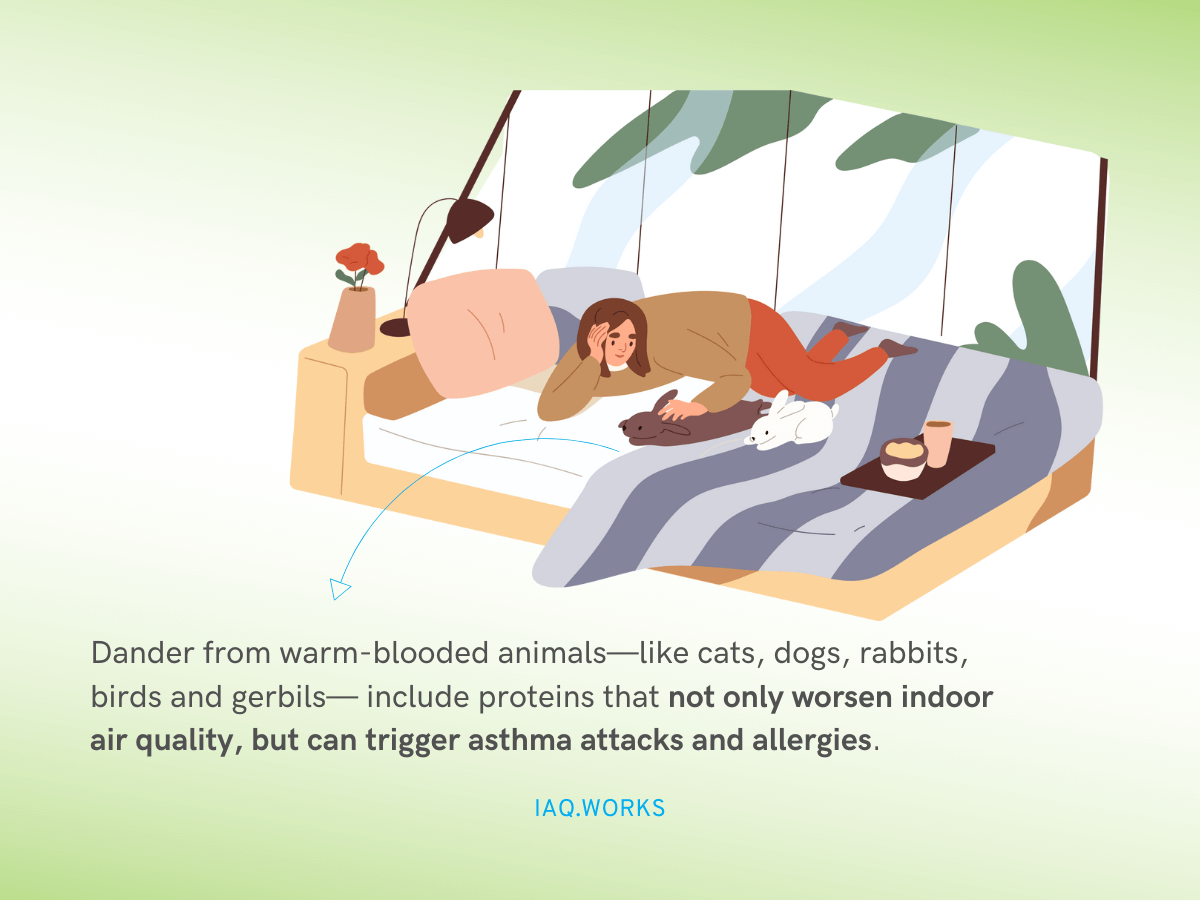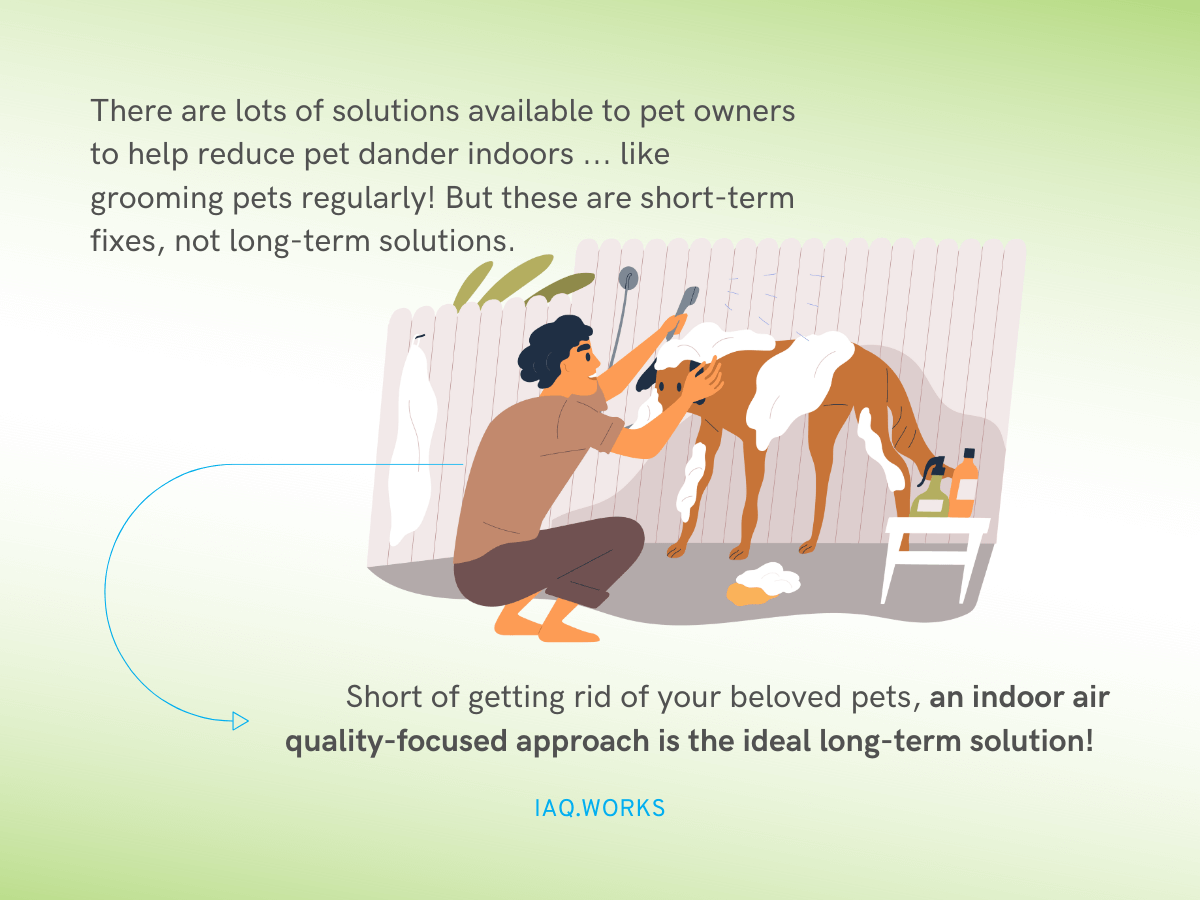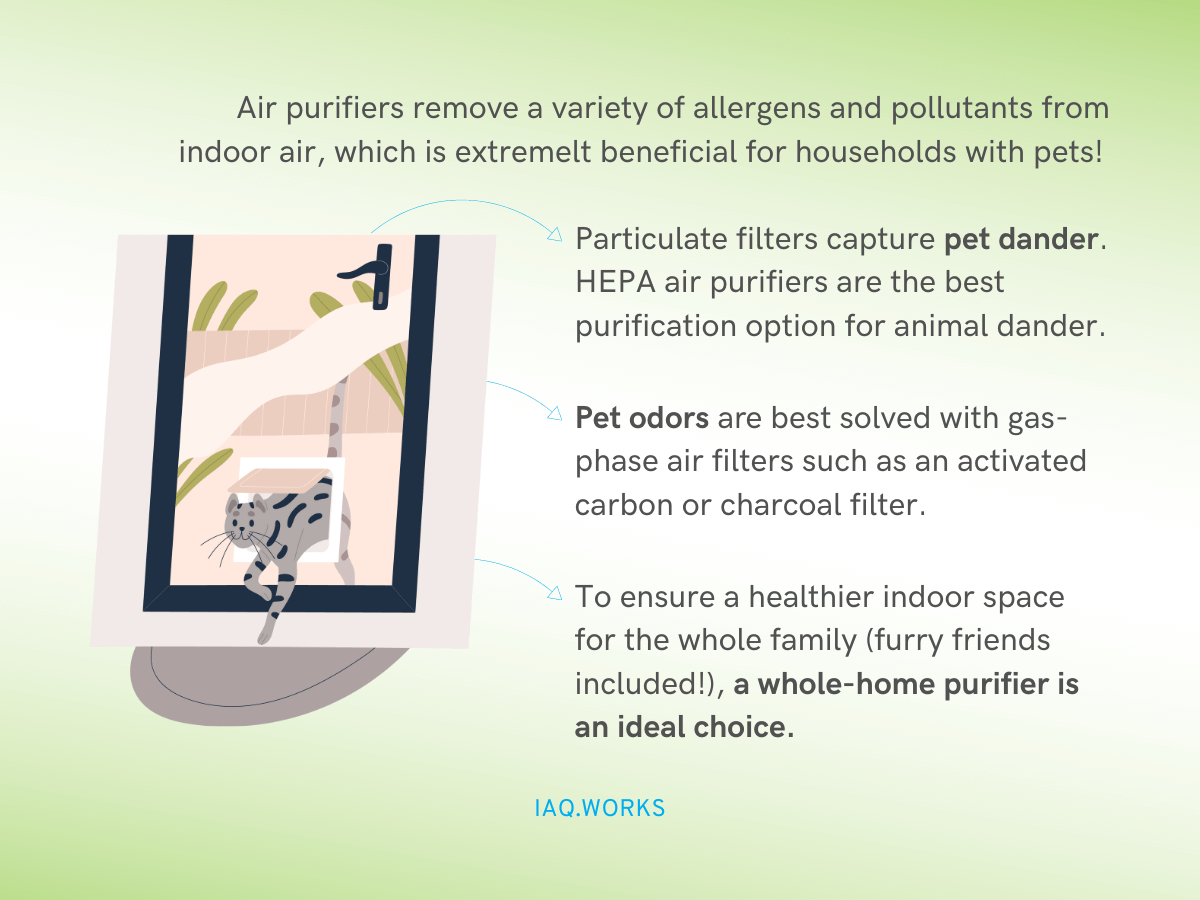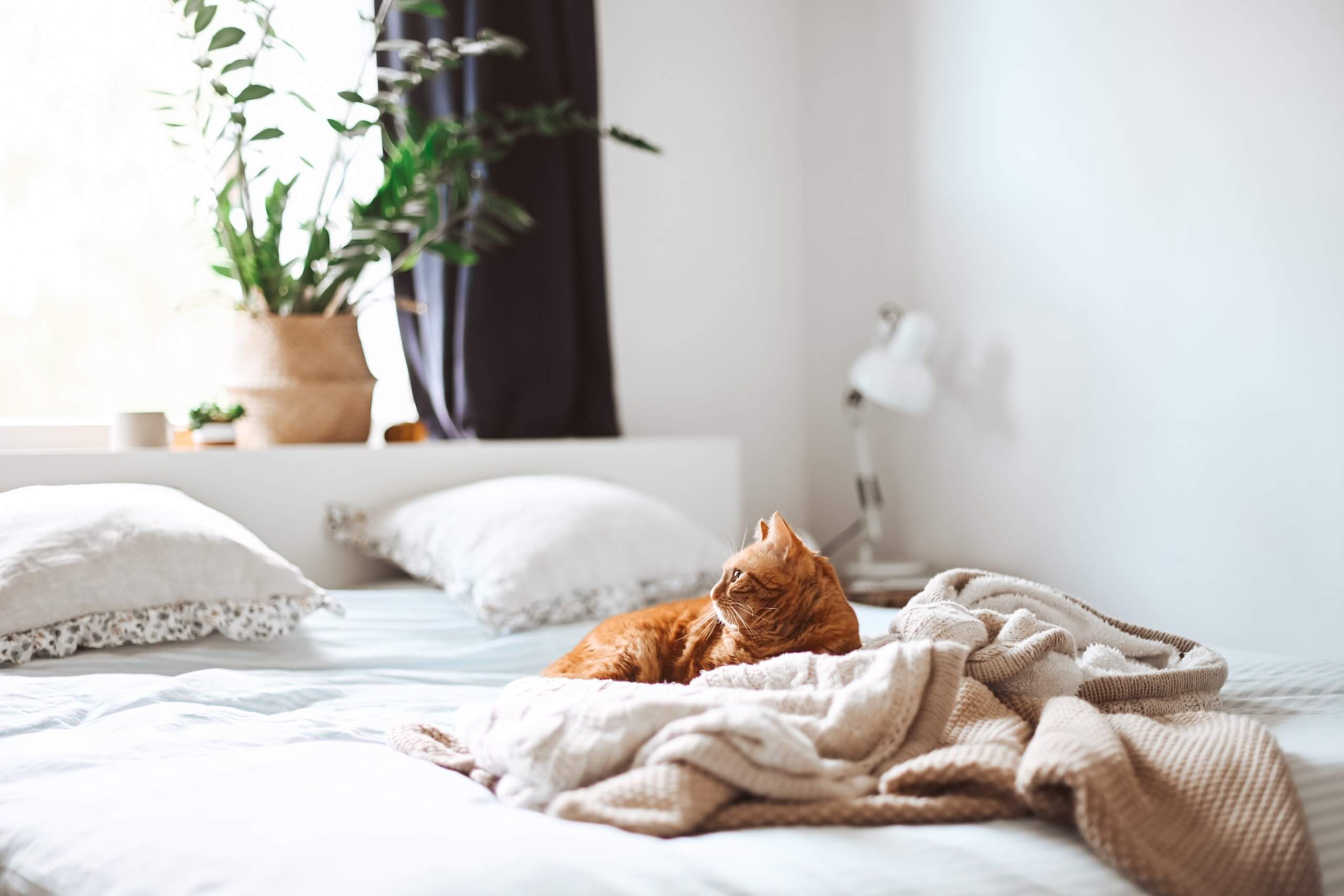Did you know that 10–20% of the world’s population have cat and dog allergies? On the high end, that’s more than one billion people! This is a shocking figure, especially considering roughly 7 out of 10 households in the United States have a pet.
Cats and dogs aren’t the only household pets. Many families also have pet rabbits, guinea pigs, hamsters and ferrets. All of these animals shed and release proteins that cause allergic reactions.
These proteins are found in their hair, saliva, urine and dead skin cells (also known as dander or pet dander). Pet dander and the related pet epithelia are a type of biological pollutant, meaning they come from a living organism.

Individuals with pet allergies who are exposed to cats, dogs or other pets may experience the following symptoms:
- Runny nose
- Sneezing
- Itchy or watery eyes
- Itchy nose or throat
- Congestion
- Coughing
For those with animal allergies, long-term exposure to pets results in chronic symptoms, such as persistent congestion. However, these symptoms often do not appear to be the result of pet allergies because they are ever-present.
Should You Get an Air Purifier if You Have Pets?
The all-important question. As aforementioned, people with pet allergies aren’t actually allergic to their pet’s hair, saliva, urine or dander. They are allergic to the protein found in these biological pollutants.
There are a number of options available to pet owners with pet allergies. For example, wearing a mask when cleaning, removing wall-to-wall carpet, grooming your pet frequently and taking over-the-counter or prescription medicine. All of these solutions are great, but none of them are indoor air quality solutions.
In most instances, these solutions act as a Band-Aid. In other words, they don’t resolve the issue, they simply cover it up. That’s where IAQ solutions are different.
So, what should be your first line of defense? What would make an excellent addition to your pet dander arsenal? And what solution simultaneously supports indoor air quality? Hint: it’s air purification!

How Much Do Air Purifiers Help With Pet Allergies?
Pet dander can be found everywhere … and we mean everywhere. Walls, carpets, hardwood floors, curtains, furniture, pillows, clothes, shoes, you name it!
In fact, despite your best efforts to clean routinely, these allergens may be present for up to six months after the animal is gone. Yes, after! This is particularly true for cat allergens.
Pet dander is actually quite sticky, making them difficult to remove. In fact, trying to remove them often makes the situation worse. Vacuuming, dusting, sweeping and other methods of cleaning stir up the allergens after they’ve settled. Once airborne, they tend to stay airborne for a while.
Don’t get us wrong, cleaning is usually helpful and it does remove allergens.
But it shouldn’t be the only tool in your toolbox. Air purification is a helpful addition as it removes allergens, viruses, bacteria and many more pollutants from the air. Not to mention it helps reduce the number of allergens circulating in your home that are stirred up by traditional cleaning methods.
While air purification cannot magically eradicate your allergies, the resulting reduced allergen concentration in the indoor air helps alleviate allergy symptoms.
Do Air Purifiers Help With Pet Dander?
Yes, some air purifiers effectively reduce pet dander. The Best air purifiers for pet dander have a high-efficiency air filter. Specifically, those that are equipped with a high-efficiency particulate air filter, or HEPA filter.
HEPA filters remove 99.7% of pollutants that are 0.3 microns in size. This includes allergens, viruses and bacteria particles. For reference, pet dander is roughly five to 10 microns, on average. That is significantly larger than 0.3 microns. Thus, air purifiers equipped with a HEPA filter excel at removing pet dander.
Do Air Purifiers Get Rid of Pet Odors?
Yes, some air purifiers can reduce pet odors! Air cleaning solutions that minimize pet odors are equipped with an activated carbon or charcoal air filter, which captures odors.
Think of setting a bowl of distilled vinegar in your fridge to neutralize the smell of boiled eggs … the same concept. Also important to note is that activated carbon and charcoal air filters must be replaced frequently to be effective.
Best Air Purifiers for Pet Allergies

HEPA Air Purifiers For Pet Dander
As we mentioned before, HEPA filters make the best air purifiers for pet dander.
Generally, HEPA filters are used in the medical field as they have a high minimum efficiency reporting value (MERV) rating. How high? A rating of 16 and up—which is usually unsuitable for residential spaces because it restricts airflow.
 More: Confused about HEPA, MERV and any other air filter acronyms you might have come across? Check out our simple MERV vs. HEPA guide for homeowners →
More: Confused about HEPA, MERV and any other air filter acronyms you might have come across? Check out our simple MERV vs. HEPA guide for homeowners →However, a purification device with a HEPA filter doesn’t affect your home’s airflow. More often than not, HEPA filters are found in portable air purification devices suitable for residential buildings. While they do not address the home as a whole, they benefit from single rooms or areas. With this said, there are whole-home HEPA filtration solutions, they’re simply a bit harder to come by.
If pet dander is your top concern, opt for a HEPA air purifier. This ensures that whichever room you’re targeting receives the best particle filtration available.
Best Air Purifiers For Pet Odors
Gas-phase air filters include activated carbon and charcoal filters. These air filters effectively reduce pet-related odors. The process is called gas sorption. A sorbent (in this case, activated carbon or charcoal) absorbs odors. Thus, homes are left with cleaner air and a fresher scent.
Much like HEPA filters, gas-phase air filters aren’t common in residential spaces. They are not suitable as the primary, or only, home air filter. This is because they only absorb odors, they do not filter out particles. Thus, they are best used as a secondary filter.
If pet odors are your top concern, choose an air purifier that includes both a particulate filter and a gas-phase air filter.
Best Home Air Purifier For Pets
Whole-home air purifiers are beneficial for homeowners looking to clean the air throughout the entire home, all at once.
They work well with most air filter types and most MERV ratings. (For example, a pleated MERV 13 air filter, which we highly recommend.) A whole-home air purification system installs directly into your home’s central air system and uses the existing ductwork system to provide cleaner air everywhere.
Whole-home air purifiers not only provide cleaner air to the entire home, but they can also have a primary and secondary air filter to effectively capture allergens and reduce odors. You get the best of both worlds!
Home Air Purifier for Pets
We love our furry friends to the moon and back! For most homeowners, their pets are their family. Unfortunately, that doesn’t make pet allergies any easier to deal with.
Depending on the pet-related issues you’re facing, an air purifier solution will significantly improve indoor air quality.




